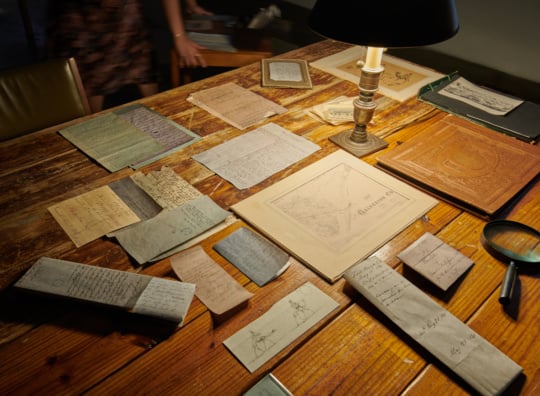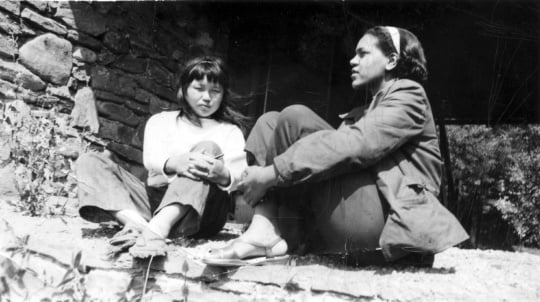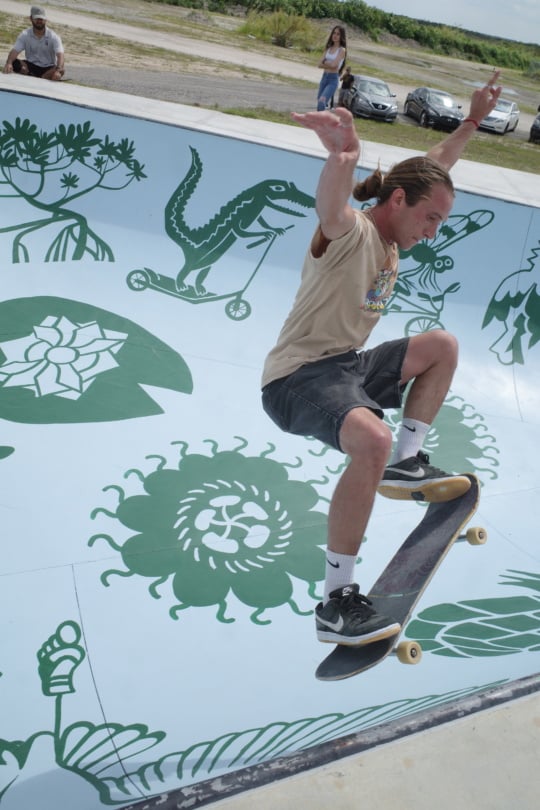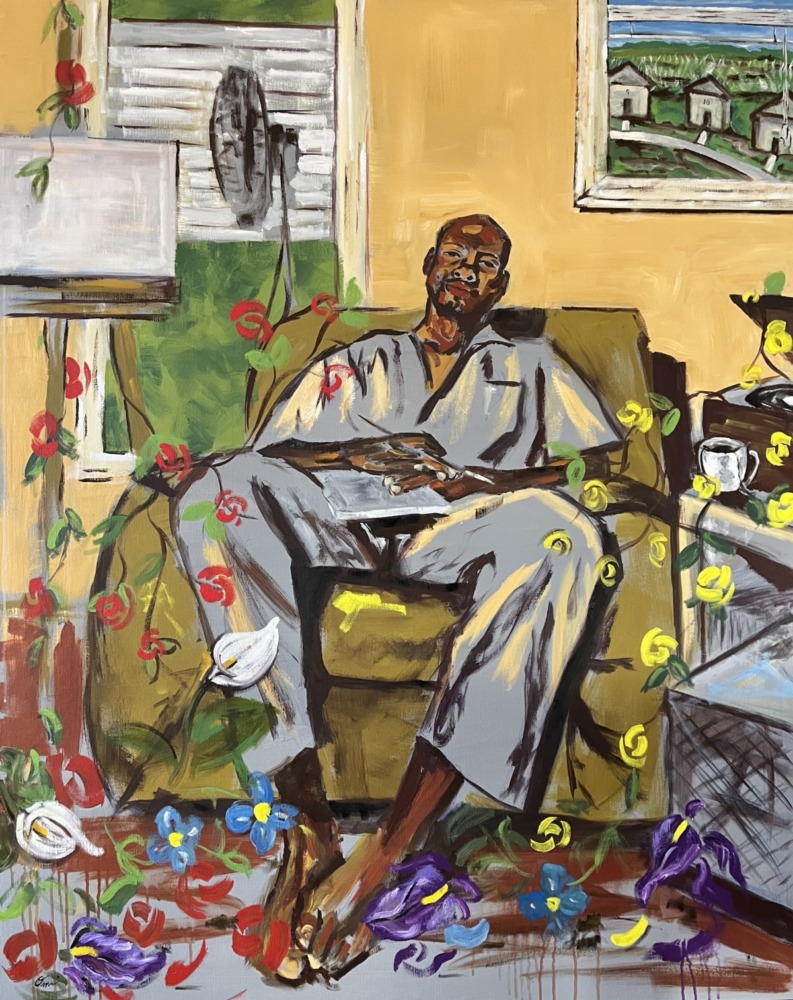
In 2008, Omari Booker entered a fifteen-year prison sentence at Charles B. Bass Correctional Complex in Nashville, Tennessee. Booker pled guilty to a minor drug possession charge expecting probation.
After serving three and a half of the fifteen years, he was released on parole. At the time, his work on the Fifteen exhibition had already begun with a portrait of Samuel Dunson, Booker’s mentor, professor, and friend.
Since the beginning of his career, Booker has worked to educate Nashville on systemic oppression and showcased the powerful faces of the Black community through his Channel To Channel gallery exhibitions in Nashville, TN: Red Line (2019) and Portraits of Culture (2021). Now with Fifteen, he’s exhibiting an introspective volume of portraits depicting fond, familial memories and confinement nightmares. This exhibition comprises thirty-seven artworks, twenty-six oil on canvas paintings, and eleven pencil drawings on paper. The papers used are Booker’s parole travel permits along with saved envelopes sent from him and to him while in the correctional facility. Three of the paintings are paired with an introspective essay entry also written while incarcerated.
As a native Nashvillian, he honors his love of community through portraiture. Booker imbues his intimate portraits of self and family with an unexplainable magic. These paintings are filled with humility compared to the works depicting the correctional facility, which counter with the hope and love he prioritized during the dark period of confinement. Grief and despair are subdued with flowers puncturing the canvas with beauty. These works ask: how can a city with a tight-knit community have the most oppressive correctional system in the United States?
In early 2018, North Nashville had the highest incarceration rate in the nation at roughly 14%.1 Meanwhile, several white nationalist hate groups originated in Tennessee and law enforcement more broadly. The co-existence of these facts testifies to the effects of capital punishment and institutionalized racism.
It is culturally significant that Booker’s latest exhibition is located in North Nashville at Elephant Gallery. Booker is a crucial part of North Nashville’s artistic legacy as a muralist, painter, and graduate of Tennessee State University. However, many of the works in Fifteen were created in Los Angeles, a city Booker has self-defined as relaxed and easy on his spirit.
This Black Bird is a 96 x 96 in. stunning self-portrait on two panels. Booker details this oil painting with fine precision depicting himself in his cell at Charles B. Bass Correctional Complex. The youth of his face strike the viewer with a cruel reality—this is a young man facing an unjust punishment. Every detail pulls you deeper into his physical and psychological confinement, from the blurred reflection of Booker’s face in the mirror to the pictures of his loved ones in the cell’s cabinet. Printed on the wall next to the painting is a poem by Booker of the same name. Sharing themes with Maya Angelou’s I Know Why The Caged Bird Sings, Booker succinctly and poetically describes civil rights, Black power, and the Black visual arts movement.
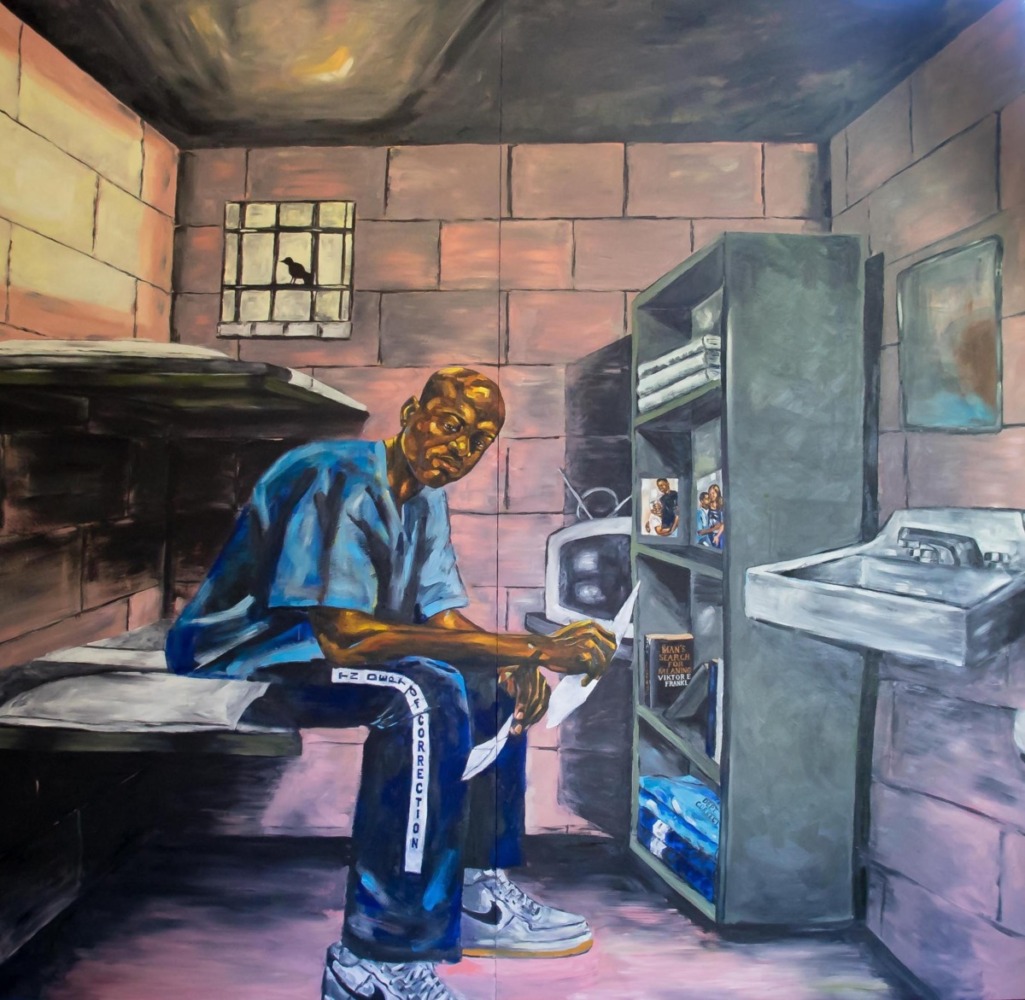
Booker’s artwork highlights the criminal justice system as ongoing human slavery. For an incarcerated person, everything they possess is borrowed and can be ripped away. Free labor is required from inmates. Living conditions vary from comfortable to unlivable, often including life-threatening health code violations. Factors that influence one’s housing assignment include the alleged crime and the incarcerated person’s race. The amount of will and constraint Booker conveys in each correctional painting is staggering. He exercises the mind so the memory of an embrace is pure warmth on the skin, instead of cold with prickly goosebumps. Booker depicts hard truths in his paintings. There is pain in this exhibition, but there is also joy. Art is essential to Booker’s practice of mental health.
The work Corrected propels the viewer to the end by showing Booker at the conclusion of his fifteen-year sentence as of April 11, 2023. Booker’s work begs the question: why has society given prisons the term “correction”? This word implies a sort of therapy or healing, but what if the individual didn’t need correcting in the first place? Booker’s self-portrait shows him reclining in his living room posing with a canvas and paintbrush atop his lap. Flowers are blooming throughout the room, flowing in from the open window, down to the carpet below, and on to the record player on the side table.
Though this city’s criminal “justice” system confined him, it’s Nashville’s artistic community that revived him. “All these flowers growing are the product of when a community pours into a person, so thank you,” he said to the packed house at the Elephant Gallery opening reception. When we’ve all returned to the soil, Booker’s artistic legacy will remain. Now, he’s free.
1 Sierra Rains, “North Nashville had the highest incarceration rate in the nation in 2018; What’s changed since?” (WKRN News) January 12, 2023. https://www.wkrn.com/news/local-news/nashville/north-nashville-had-highest-incarceration-rate-in-the-nation-in-2018-whats-changed-since/amp/

